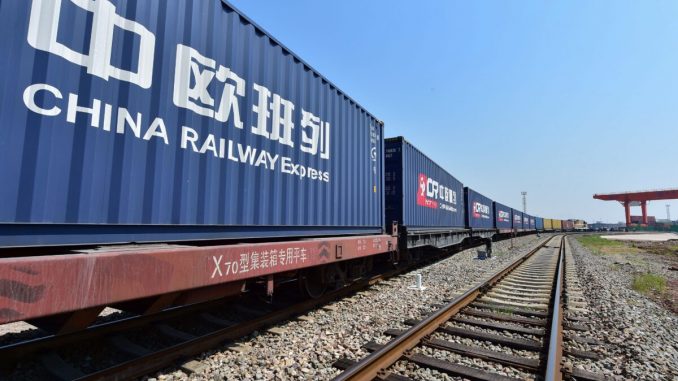
The Chinese regime paid subsidies to maintain and develop the freight train operations that connect China with Central Asia and Europe, according to government documents exclusively obtained by The Epoch Times from a trusted source. Experts said that this railway would allow China to build ties with other countries in a bid to decouple from the United States.
“The Chinese regime is preparing for a potential decoupling from the United States, as well as maintaining its fragile economic system, by using the freight train to export more products to Europe and Central Asia,” Tang Jingyuan, U.S.-based China affairs commentator, told The Epoch Times on May 4.
In 2020, the trade between the United States and China reached 4.06 trillion yuan (about $627.14 billion), which accounts for 12.6 percent of China’s foreign trade, according to official data.
In 2019, amid the U.S.-China trade war, the United States was the second largest importer of Chinese products, buying $418.5 billion worth of goods, and suffered a $295.8 billion trade deficit, according to a report by China’s Ministry of Commerce. In 2018, when the trade war started, the trade between the United States and China amounted to $633.52 billion, accounting for 13.7 percent of China’s total foreign trade, and China enjoyed a $323.33 billion trade surplus, the Ministry reported.
Jin Canrong, one of Beijing’s top China-U.S. relations specialists, also said China is creating new business circles as it anticipates a potential decoupling from the United States.
The leaked documents obtained by The Epoch Times stressed the importance of the Trans-Eurasia Logistics, a railway that connects China with Central Asia and Europe. The documents were issued by China’s northern Hebei provincial government, Baoding city government, and Changchun city government.
The Trans-Eurasia Logistics, also called the China Railway Express (CR Express), was launched in March 2011 and is a key part of the regime’s Belt and Road Initiative (BRI, also known as One Belt, One Road). It ships the goods from over 40 Chinese cities to about 90 cities in over 20 countries, including Germany, UK, Spain, France, and Italy, which brings a big trade benefit to Beijing.
“From June 2020 to today, over one thousand trains have transported freight goods in BRI regions. The CR Express is a super tool that stabilizes the foreign trade of China,” the Chinese State Council (cabinet-level) posted on its website on April 20.
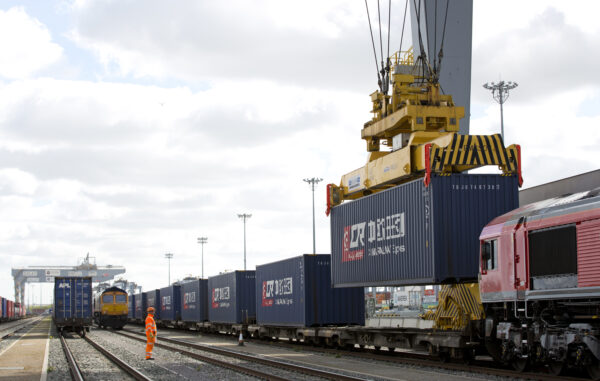
Government Subsidies
The exclusive documents show that the Chinese government subsides created this prosperous railway transport.
The Hebei provincial government released an internal document on March 5 to roll-out the ten most important tasks in the province. Foreign trade was one of the tasks and the CR Express is a key tool.
“[Each government] should research and develop policies to give subsidies to the international freight trains. [We must] operate the trains to Central Asia and Europe stably, develop more trains to other cities in the Association of Southeast Asian Nations [ASEAN], and maintain the transportation channels for the foreign trade,” the document stated.
A series of government documents from Baoding city in Hebei mentioned the CR Express. Baoding would use the trains to sell products to Belarus, Lithuania, and Russia.
According to a document that was issued by Baoding authorities on June 29, 2017, the trains would help the city to export 250,000 metric tons of goods valued at $2 billion to Belarus, and 150,000 metric tons of goods valued at $1.2 billion to Lithuania every year.
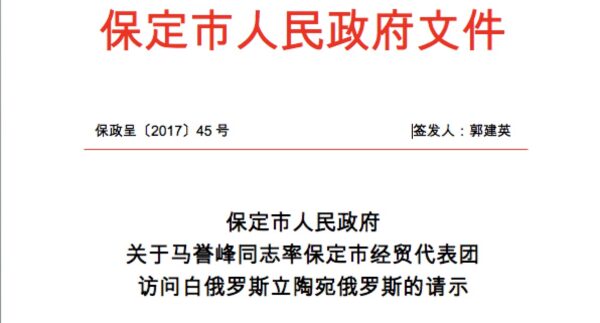
The document said the train helped the city to develop its BRI projects, including a hospital in Lithuania and industrial parks in Minsk, Belarus and Saint Petersburg, Russia.
“The space of the China-Belarus Industrial Park is 91.5 square kilometers [35.33 square miles], which is equal to one third of the total area of Minsk … it is the largest industrial park that China operates overseas, with the best investment policies. This is the biggest cooperation investment between China and Belarus, as well as the key project of BRI,” the document described.
From its website, the park’s official name is Great Stone, and the Chinese enterprises that have factories in the park are selling products to the Commonwealth of Independent States (CIS) or former Soviet Union countries.
The Baoding government explained in the same document that the Chinese regime plans to export materials to Minsk and assemble products there, which would cut costs and generate more profit.
Authorities in Changchun, the capital city of northeastern Jilin Province, issued a document which claimed that the majority of the CR Express trains are operated by state-run companies and they rely on state subsidies because “it’s a common issue that [transportation agents] can’t collect enough orders to ship goods from Europe back to China.”
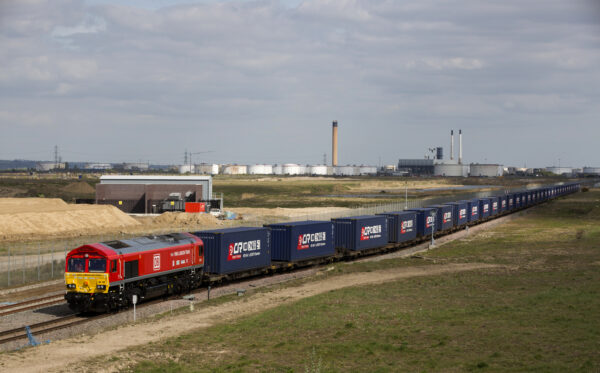
Chinese state-run China Business Journal reported on July 27, 2019 that China Railway requires each freight train to have 41 containers, and the majority of the CR Express trains aren’t fully loaded. “About 20 percent of the containers on the outbound trains are empty,” the report quoted staff from the Urumqi Railway Bureau.
There are more empty containers found in the inbound trains. “Sometimes, only one of the 41 containers [of an inbound train] contained goods,” the report quoted a staff from China Railway’s headquarters in Beijing.
The Next Federation, a Chinese summit organizer and partner of state-run media Xinhua and China Economy, published an article on Dec. 20, 2020, in which it said: “The local city government pays around $3,000 per container per trip for all CR Express trains.”
The report said many cities had to find a way to deal with the empty containers in Europe and Central Asia because they can’t collect any goods, and the cost to ship the empty containers back to China is more expensive than making a new container.
The report said some city governments pay 1 billion yuan (about $154.47 million) annually as subsidies, others pay 1 million yuan (about $154,470) per train as subsidies, because the income of the shipping can’t cover the cost.
The report commented that the CR Express is the Chinese regime’s contrivance to damage the maritime hegemony of the United States, because the regime believes that creating a competitive transportation channel can change the global supply chain.
According to official data, to ship one container, the transportation cost of the CR Express is 25 percent of the cost that is transported by flight; and the duration of a CR Express trip is about 33 percent of a trip by sea. Based on several global transportation services websites, the CR Express needs three times the amount of time to ship a container than a plane, and costs double than a ship.
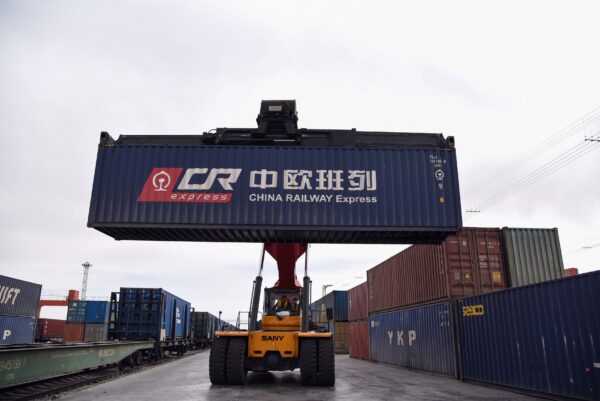
Prepare for Decoupling
Jin Canrong, a professor and associate dean of the School of International Studies at Beijing’s Renmin University of China, talked about the potential U.S.-China decoupling in a video that was posted on YouTube on June 22, 2020.
Jin said the U.S.-China relations is deteriorating.
“It’s possible that the United States will decouple from us in economy, technology, and education,” Jin said. “After the pandemic, I estimate that the United States and China will become more strategically hostile. At that time, the United States will decouple from China.”
Jin then talked about the solutions, which included “setting up business circles without the United States,” such as doing business with countries in “Southeast Asia and Northeast Asia.”
China expert Tang Jingyuan reviewed the government documents and said: “It’s clear that the Chinese regime wants to build a new trade channel with Europe and Central Asia by using this railway project. At the same time, the project opens a door to allow Beijing to form closer economic ties with these regions.”
Analyzing the motivation behind the railway, Tang believes that China is preparing for a potential decoupling from the United States and to fulfill its ambition in becoming the world’s largest economy.
“The Chinese regime eagerly teams up with Europe, by which it believes that the combination can become stronger than the United States in economic terms. Then the Beijing authorities will find a way to get rid of Europe and become the leader,” Tang added.



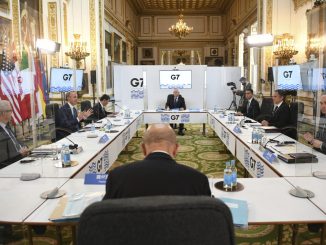

Be the first to comment